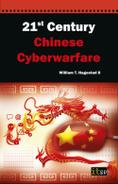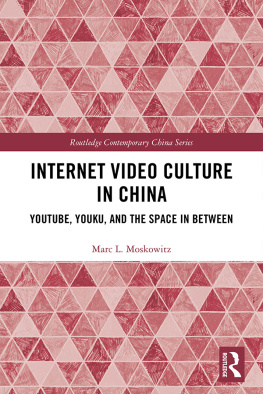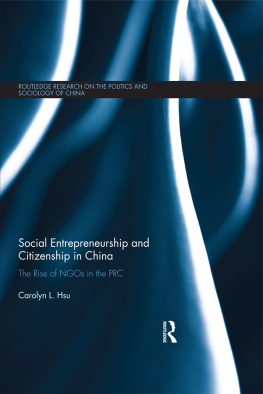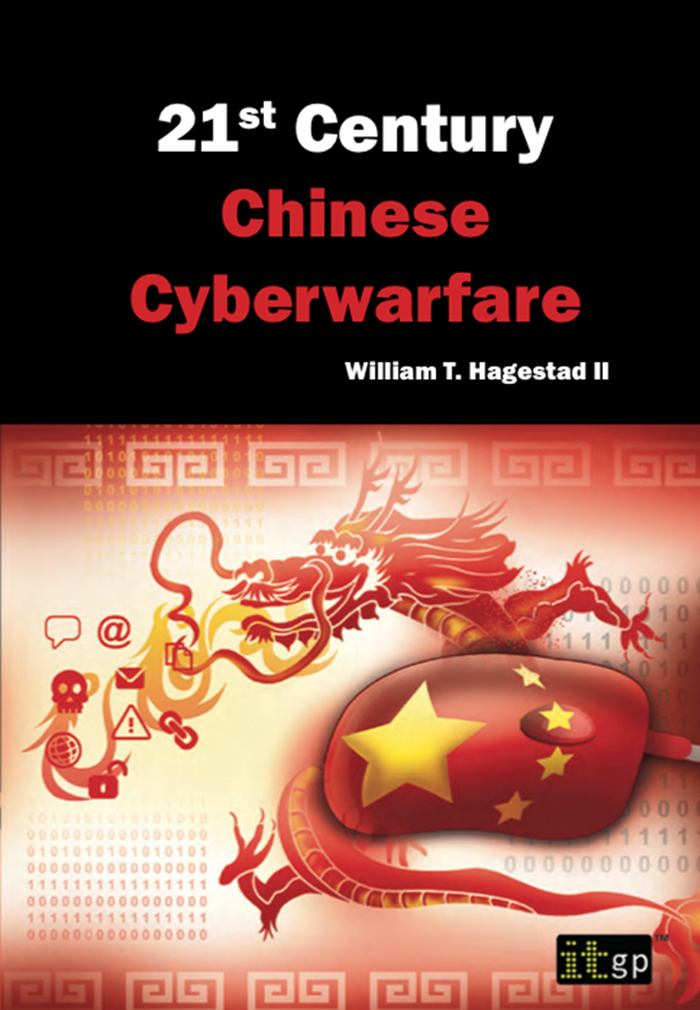21st Century Chinese Cyberwarfare
An examination of the Chinese cyberthreat from
fundamentals of Communist policy regarding
information warfare through the broad range of
military, civilian and commercially supported
cyberattack threat vectors
WILLIAM T. HAGESTAD II

Every possible effort has been made to ensure that the information contained in this publication is accurate at the time of going to press, and the publisher and the author cannot accept responsibility for any errors or omissions, however caused. Any opinions expressed in this publication are those of the author, not the publisher. Websites identified are for reference only, not endorsement, and any website visits are at the readers own risk. No responsibility for loss or damage occasioned to any person acting, or refraining from action, as a result of the material in this publication can be accepted by the publisher or the author.
Apart from any fair dealing for the purposes of research or private study, or criticism or review, as permitted under the Copyright, Designs and Patents Act 1988, this publication may only be reproduced, stored or transmitted, in any form, or by any means, with the prior permission in writing of the publisher or, in the case of reprographic reproduction, in accordance with the terms of licences issued by the Copyright Licensing Agency. Enquiries concerning reproduction outside those terms should be sent to the publisher at the following address:
IT Governance Publishing
IT Governance Limited
Unit 3, Clive Court
Bartholomews Walk
Cambridgeshire Business Park
Ely
Cambridgeshire
CB7 4EA
United Kingdom
www.itgovernance.co.uk
William T. Hagestad II 2012
The author has asserted the rights of the author under the Copyright, Designs and Patents
Act, 1988, to be identified as the author of this work.
First published in the United Kingdom in 2012 by IT Governance Publishing.
ISBN 978-1-84928-366-3
FOREWORD
If you know the enemy and know yourself you need not fear the results of a hundred battles.
Sun Tzu
Time is an interesting word. When we think about time and more specifically how cultures, countries, and technology evolve with time we realize the only certainty is the past. The author of this book has spent a lot of time, more than 27 years in fact, studying cultures in a military capacity. To know an adversary intimately is to respect their capability and understand their perspective. Lieutenant Colonel William Hagestad is considered an expert on the Chinese Peoples Liberation Army (PLA) because of the time he spent analyzing the capabilities of the PLA during his tenure in the United States Marine Corps. But his expertise also includes the culture of China and how the Chinese leverage technology. Bill has travelled extensively all over the world, served in many different military theaters and this book represents the nexus of his experiences.
21st Century Chinese Cyberwarfare is not just another text describing the information warfare capability of the Chinese. Moreover this book is about time, and also about understanding. Through the eyes of Lt. Col. Hagestad, the reader gains insight into the culture, history and language of the Chinese. These three things are significant drivers of ideology, military or otherwise, and the author educates the reader as to their importance in China. Ideology often inspires or determines a particular action and in terms of security, it is often helpful to understand the ideology of your adversary. Understanding information technology, information security, and the challenges an interconnected world face in the digital age are equally important. As readers, we have the unique privilege to benefit from Lt. Col. Hagestads experience and through his analysis we gain a better appreciation for the driving forces behind many of the stories currently reported today regarding Chinese electronic warfare.
Finally, many people have a limited understanding as to the military capability of their country or other countries for that matter. The images of tanks, planes and troops marching across deserts can be found daily in a number of newspapers or magazines. If we think about time and the evolution of warfare, we realize that military strategy has changed but the tools used to accomplish the mission have evolved at a far greater pace. Knowing how to use the tools and knowing how to deploy the tools in the most appropriate manner are equally important. Behind the scenes, there are many critical functions that most people never see on CNN as the troops march by. Those critical functions for protecting the security of a nation are explored by the author and because of his experience in the United States Marine Corps we are provided rare insight to the most awesome of capabilities any military brings to bear.
I hope you enjoy reading 21st Century Chinese Cyberwarfare and challenge yourself to keep an open mind as you turn the pages.
Mike
Michael L Kearn, CISSP
PREFACE
Future wars will not be kinetic. These conflicts will be waged in cyberspace; the opponents will rarely, if ever, meet each other face to face in the physical realm. Cyberwarriors will be the participants of future political will, just as warfighters since time immemorial have carried out the political instructions of their Government managers. Countries will cross digital boundaries to carry out the policy demands of their nation-state against other nation-states digitally, and not kinetically. Victims of future cyberwarfare will be a combination of traditional non-combatants civilians, military personnel, their families and every man, woman and child that resides within a geographical space now recognized as a country, or nation-state.
Cyberwarfare will be the new form of todays kinetic effects-based conflict. However, instead of physical destruction, these cyberincursions and attacks will be infrastructure-based. The targets will be the electrical grid, financial systems networks, military information networks and security systems. The cyberattackers will be based in the Peoples Republic of China and they will be carrying out the political, economic and patriotic wishes of their Chinese Communist Party masters.
The 21st century Chinese cyberwarfare will be economically, societally and culturally changing, and damaging for the nations that the Middle Kingdom chooses to cybertarget. The Peoples Republic of China will use its considerable military resources to carry out and execute plans for worldwide domination based upon its dynasties-old history and intention to never again be beholden to the vicarious wishes of an invading and colonizing foreign force.
ABOUT THE AUTHOR
Lieutenant Colonel Hagestad has a Master of Science degree in Security Technologies from the College of Computer Engineering, University of Minnesota, conferred in 2011. He also has a Bachelor of Arts in Mandarin Chinese, with minor emphasis in Classical Chinese and Modern Japanese, while also holding a second Master of Science degree in the Management of Technology from the Carlson School of Management, University of Minnesota.










